【中考夺分天天练】2015届中考英语(全国·人教版)总复习+第二篇+语法精点击:简单句陈述句、疑问句、祈使句、
文档属性
| 名称 | 【中考夺分天天练】2015届中考英语(全国·人教版)总复习+第二篇+语法精点击:简单句陈述句、疑问句、祈使句、 |
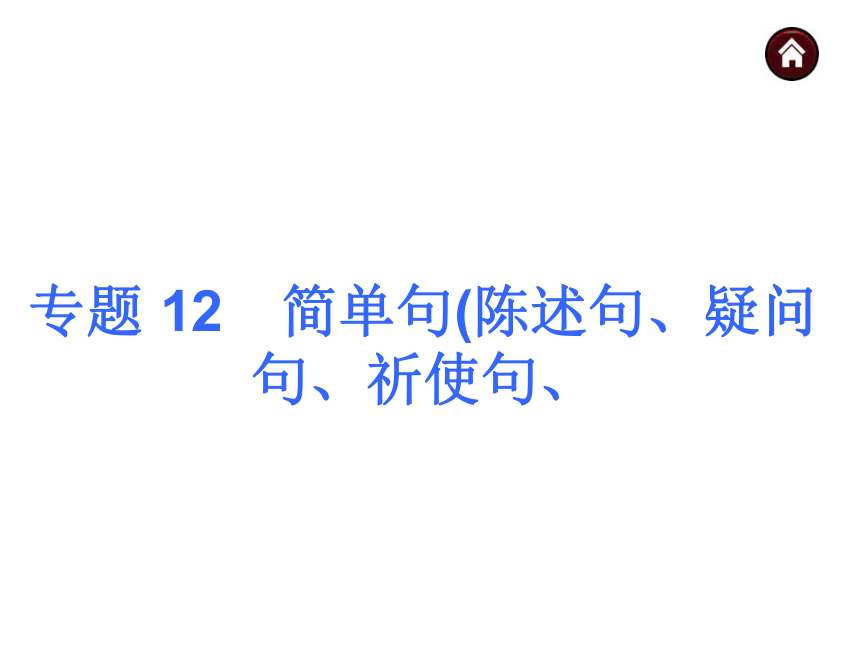
|
|
| 格式 | zip | ||
| 文件大小 | 32.3KB | ||
| 资源类型 | 教案 | ||
| 版本资源 | 人教新目标(Go for it)版 | ||
| 科目 | 英语 | ||
| 更新时间 | 2014-12-12 00:00:00 | ||
图片预览

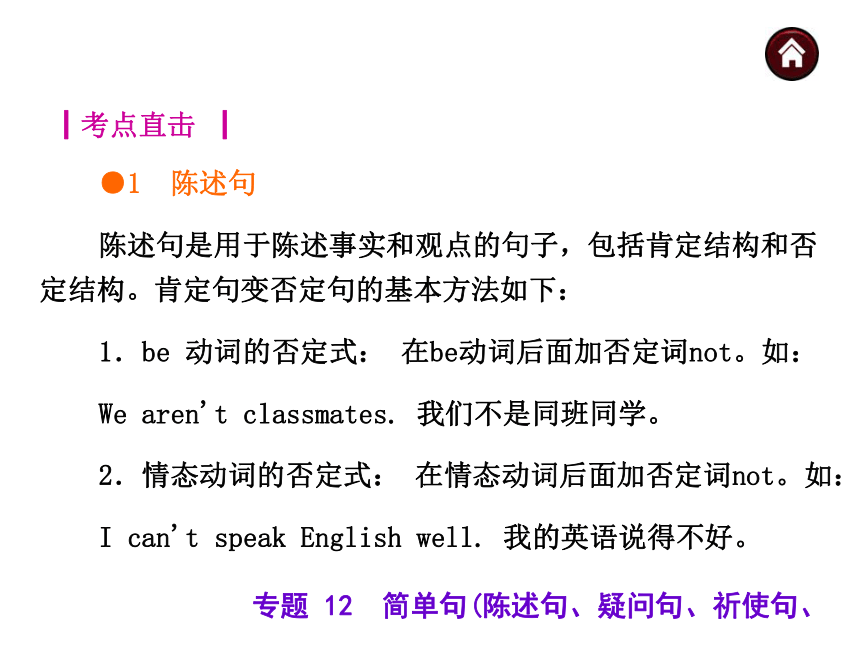
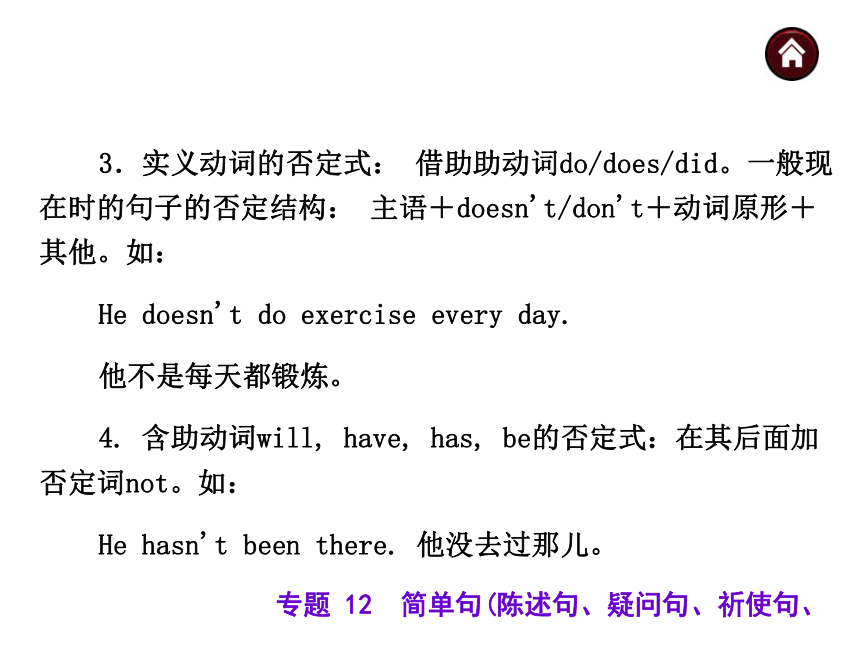
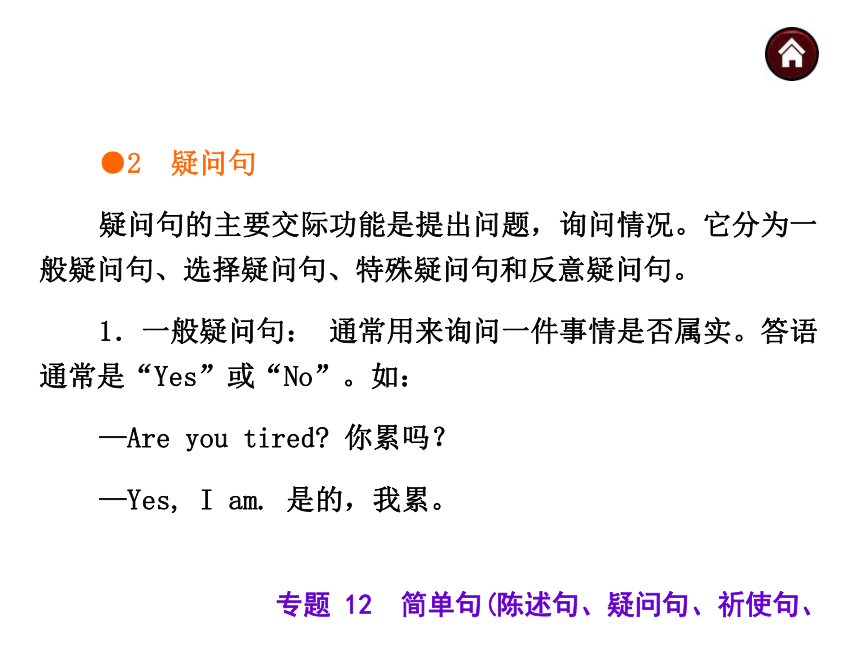
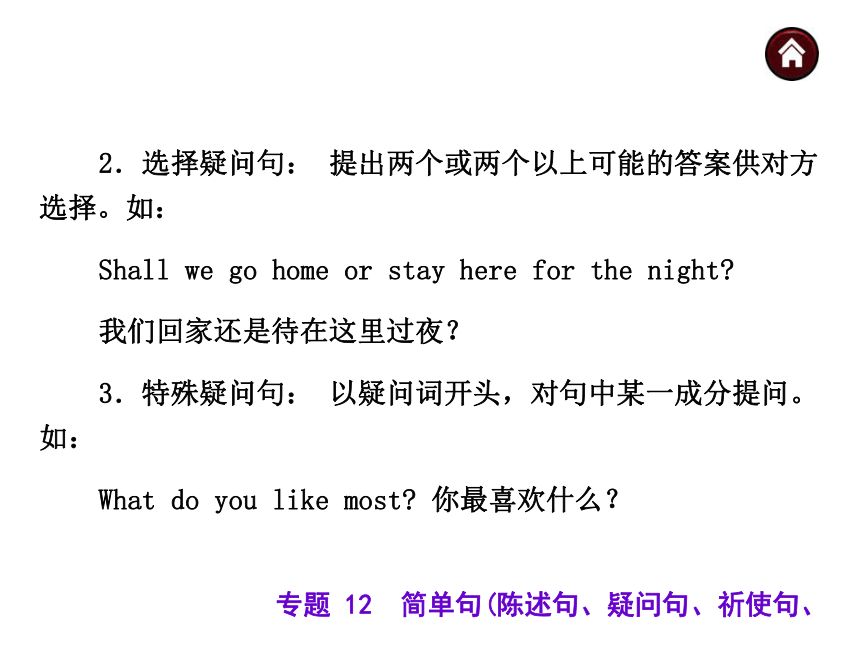
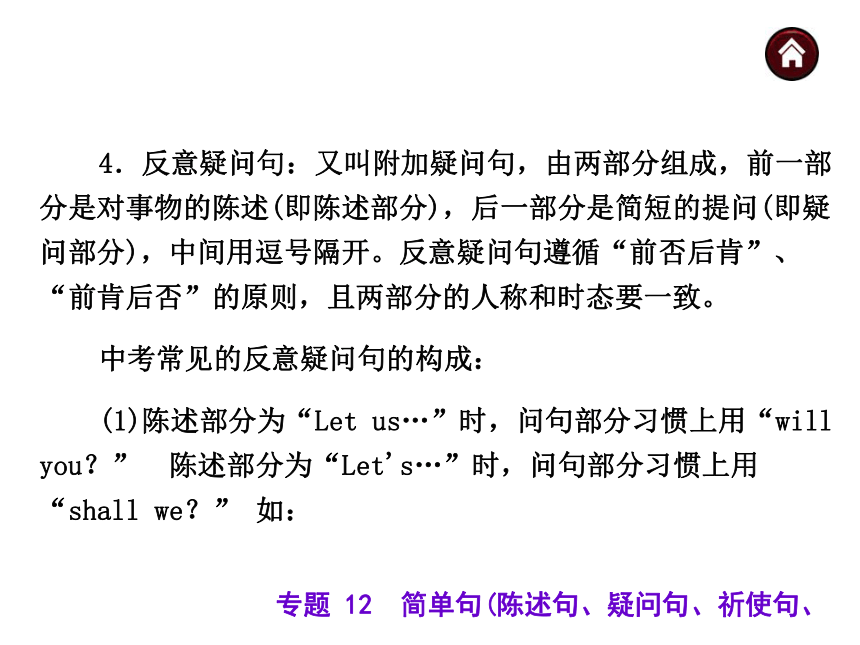
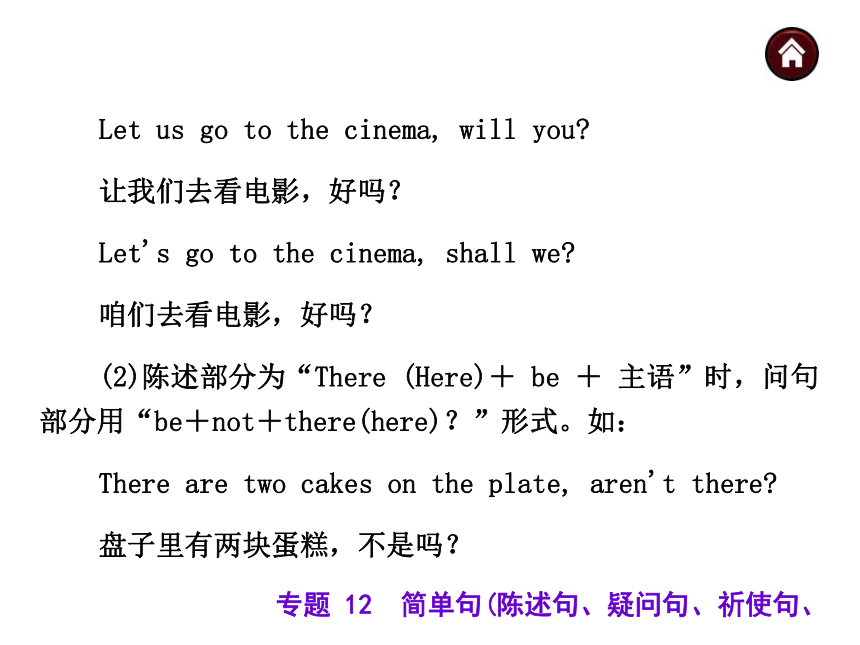

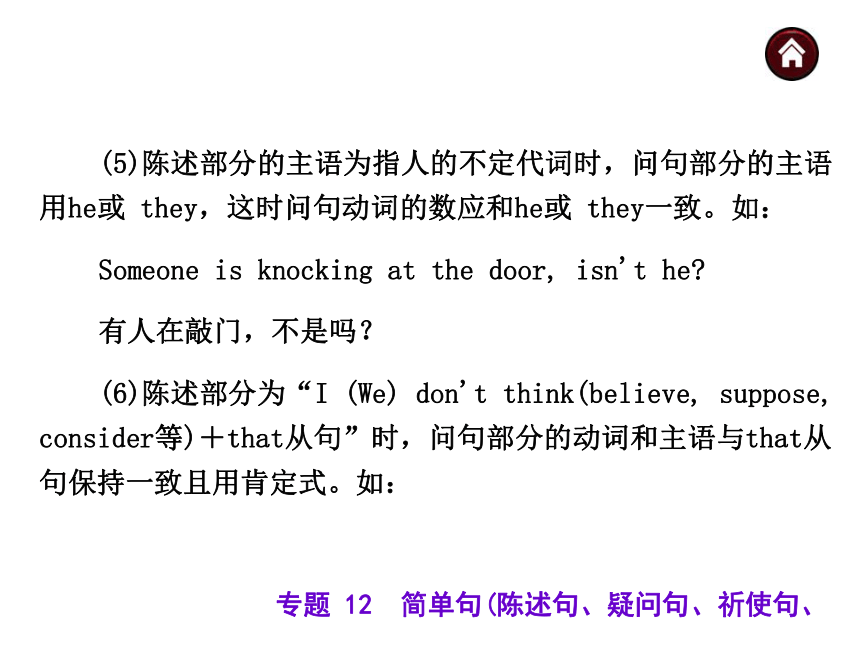
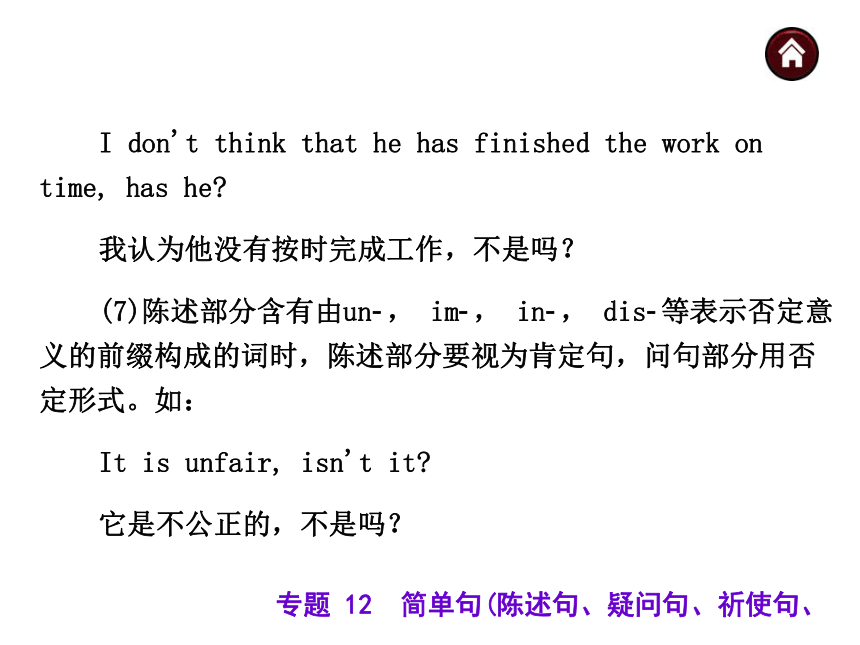
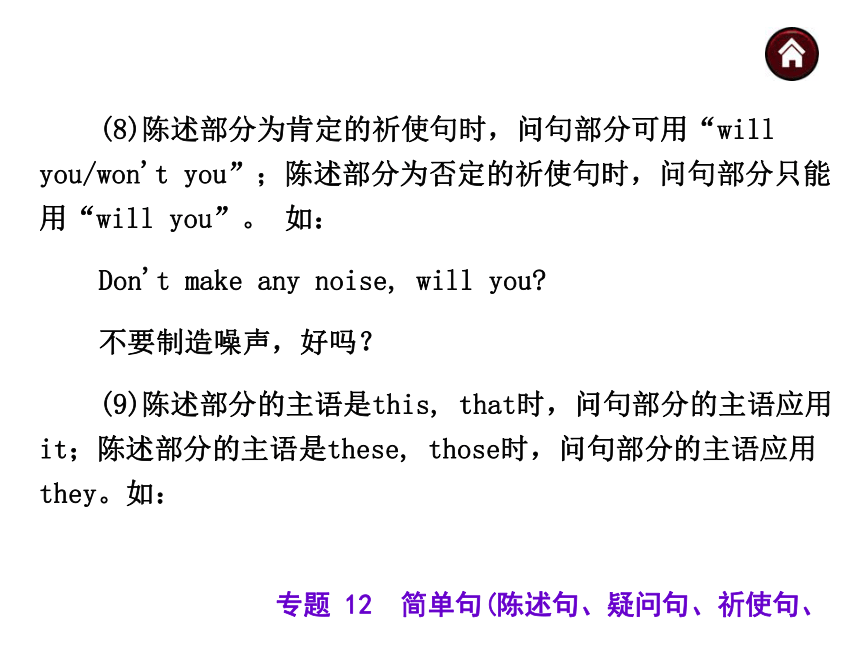
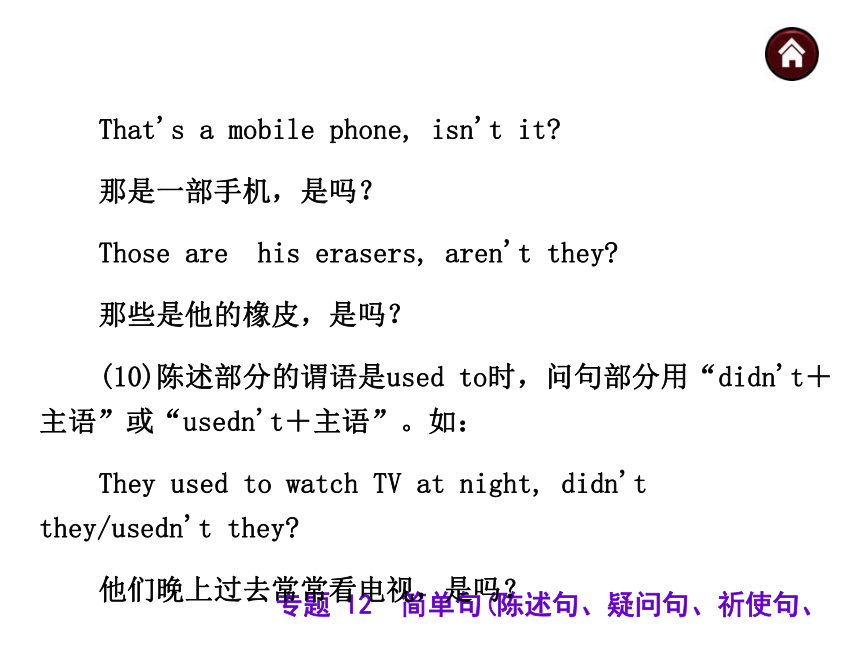
文档简介
课件51张PPT。专题 12 简单句(陈述句、疑问句、祈使句、专题 12 简单句(陈述句、疑问句、祈使句、┃考点直击 ┃●1 陈述句
陈述句是用于陈述事实和观点的句子,包括肯定结构和否定结构。肯定句变否定句的基本方法如下:
1.be 动词的否定式: 在be动词后面加否定词not。如:
We aren't classmates. 我们不是同班同学。
2.情态动词的否定式: 在情态动词后面加否定词not。如:
I can't speak English well. 我的英语说得不好。专题 12 简单句(陈述句、疑问句、祈使句、3.实义动词的否定式: 借助助动词do/does/did。一般现在时的句子的否定结构: 主语+doesn't/don't+动词原形+其他。如:
He doesn't do exercise every day.
他不是每天都锻炼。
4. 含助动词will, have, has, be的否定式:在其后面加否定词not。如:
He hasn't been there. 他没去过那儿。专题 12 简单句(陈述句、疑问句、祈使句、●2 疑问句
疑问句的主要交际功能是提出问题,询问情况。它分为一般疑问句、选择疑问句、特殊疑问句和反意疑问句。
1.一般疑问句: 通常用来询问一件事情是否属实。答语通常是“Yes”或“No”。如:
—Are you tired? 你累吗?
—Yes, I am. 是的,我累。专题 12 简单句(陈述句、疑问句、祈使句、2.选择疑问句: 提出两个或两个以上可能的答案供对方选择。如:
Shall we go home or stay here for the night?
我们回家还是待在这里过夜?
3.特殊疑问句: 以疑问词开头,对句中某一成分提问。如:
What do you like most? 你最喜欢什么?专题 12 简单句(陈述句、疑问句、祈使句、4.反意疑问句:又叫附加疑问句,由两部分组成,前一部分是对事物的陈述(即陈述部分),后一部分是简短的提问(即疑问部分),中间用逗号隔开。反意疑问句遵循“前否后肯”、“前肯后否”的原则,且两部分的人称和时态要一致。
中考常见的反意疑问句的构成:
(1)陈述部分为“Let us…”时,问句部分习惯上用“will you?” 陈述部分为“Let's…”时,问句部分习惯上用“shall we?” 如:专题 12 简单句(陈述句、疑问句、祈使句、Let us go to the cinema, will you?
让我们去看电影,好吗?
Let's go to the cinema, shall we?
咱们去看电影,好吗?
(2)陈述部分为“There (Here)+ be + 主语”时,问句部分用“be+not+there(here)?”形式。如:
There are two cakes on the plate, aren't there?
盘子里有两块蛋糕,不是吗?专题 12 简单句(陈述句、疑问句、祈使句、(3)陈述部分带有little, few, never, hardly, seldom, nothing, nobody等表示否定意义的词时,问句部分用肯定式。如:
She seldom goes swimming, does she?
她很少去游泳,是吗?
(4)陈述部分的主语为指物的不定代词时,问句部分的主语用it。如:
Something is wrong with the computer, isn't it?
那台电脑出问题了,不是吗?专题 12 简单句(陈述句、疑问句、祈使句、(5)陈述部分的主语为指人的不定代词时,问句部分的主语用he或 they,这时问句动词的数应和he或 they一致。如:
Someone is knocking at the door, isn't he?
有人在敲门,不是吗?
(6)陈述部分为“I (We) don't think(believe, suppose, consider等)+that从句”时,问句部分的动词和主语与that从句保持一致且用肯定式。如: 专题 12 简单句(陈述句、疑问句、祈使句、I don't think that he has finished the work on time, has he?
我认为他没有按时完成工作,不是吗?
(7)陈述部分含有由un-, im-, in-, dis-等表示否定意义的前缀构成的词时,陈述部分要视为肯定句,问句部分用否定形式。如:
It is unfair, isn't it?
它是不公正的,不是吗?专题 12 简单句(陈述句、疑问句、祈使句、(8)陈述部分为肯定的祈使句时,问句部分可用“will you/won't you”;陈述部分为否定的祈使句时,问句部分只能用“will you”。 如:
Don't make any noise, will you?
不要制造噪声,好吗?
(9)陈述部分的主语是this, that时,问句部分的主语应用it;陈述部分的主语是these, those时,问句部分的主语应用they。如:
专题 12 简单句(陈述句、疑问句、祈使句、That's a mobile phone, isn't it?
那是一部手机,是吗?
Those are his erasers, aren't they?
那些是他的橡皮,是吗?
(10)陈述部分的谓语是used to时,问句部分用“didn't+主语”或“usedn't+主语”。如:
They used to watch TV at night, didn't they/usedn't they?
他们晚上过去常常看电视,是吗?专题 12 简单句(陈述句、疑问句、祈使句、(11)陈述部分含有need时,若need作实义动词,问句部分用助动词do;若need作情态动词,则问句部分仍用need。如:
He needs to play sports every day, doesn't he?
他需要每天做运动,是吗?
Bob needn't clean the room, need he?
鲍勃不必打扫房间,是吗?专题 12 简单句(陈述句、疑问句、祈使句、(12)陈述部分含有情态动词must时,问句部分的谓语用needn't。must表示推测时,意为“一定,想必”,问句部分的谓语动词根据must后面的动词而定。
Bill must deal with the problems, needn't he?
比尔必须处理这些问题,是吗?
His keys must be at home, aren't they?
他的钥匙一定在家,是吗?专题 12 简单句(陈述句、疑问句、祈使句、(13)陈述部分含有have/has/had时,若其作实义动词,表示“吃,喝,玩,度过”等意思时,问句部分的谓语应用助动词do的适当形式。若其作助动词,用于完成时态中,则问句部分的谓语动词用have/has/had。
The kids had fun in the park, didn't they?
孩子们在公园玩得很开心,是吗?
Maria hasn't been to Paris, has she?
玛丽亚没去过巴黎,是吗?专题 12 简单句(陈述句、疑问句、祈使句、(14)陈述部分是否定句时,英语与汉语的回答习惯存在差异。对反意疑问句作出回答时,若事实是肯定的,用“Yes+肯定结构”;若事实是否定的,用“No+否定结构”。另外,要特别注意Yes/No的翻译。
—He didn't go to the mountain, did he?
—Yes, he did./No, he didn't.
“他没有去爬山,是吗?”
“不,他去了。”/“是的,他没去。” 专题 12 简单句(陈述句、疑问句、祈使句、●3 祈使句
祈使句是表示请求、命令、劝告、祝愿或建议的句子。其否定式直接在动词原形前加Don't。常见的祈使句的基本句型如下:
1.动词原形+其他。 如:
Be careful. 小心。
2.Do+动词原形(加强语气)。如:
Do be careful next time. 下次要小心。专题 12 简单句(陈述句、疑问句、祈使句、3.加please的祈使句(语气更加客气和礼貌)。如: Open the door, please. 请打开门。专题 12 简单句(陈述句、疑问句、祈使句、●4 感叹句
感叹句一般用来表示说话时的喜悦、惊讶等情感。英语感叹句常用what或how引导,句末用感叹号。
1.what引导的感叹句
(1)What+a/an+形容词+单数可数名词(+主语+谓语)!如:
What a difficult question it is!
多么难的一个问题啊!专题 12 简单句(陈述句、疑问句、祈使句、(2)What+形容词+可数名词复数/不可数名词(+主语+谓语)!如:
What useful information!多有用的信息啊!
2.how引导的感叹句
(1)How+形容词/副词+主语+谓语!如:
How kind they are! 他们多和蔼啊!
(2)How+陈述句(主语+谓语)!如:
How time flies!时间飞逝!专题 12 简单句(陈述句、疑问句、祈使句、3.what引导的感叹句可以和how引导的感叹句互换。如:
What a good girl!=How good the girl is!
多好的女孩啊!专题 12 简单句(陈述句、疑问句、祈使句、●5 倒装句
1.副词位于句首时。here, there, now, then等副词置于句首时 句子要倒装,谓语动词常用be, come, go, lie, run等。这种倒装的句型结构的主语必须是名词,如果主语是人称代词则不能完全倒装。如:
Here he comes. 他来了。专题 12 简单句(陈述句、疑问句、祈使句、2.only在句首强调状语时。如:
Only then did he realize that he was wrong.
到那时他才意识到他错了。
3.以so/neither/nor开头的句子。此句型用于说明前面的内容也适用于后者,结构为“so/neither/nor+be动词/助动词/情态动词+主语”。如:
John can't swim, neither can I.
约翰不会游泳,我也不会。专题 12 简单句(陈述句、疑问句、祈使句、┃考点过关┃Ⅰ.根据句意及汉语提示完成句子
1.—________ ________ (每隔多久) does your father play tennis after work?
—Every Sunday.
2.I can't play the piano, and ________ ________ ________ (他也不会).
3.________ ________ ________ (多糟糕的天气) it is today! We have to stay at home.HowoftenneithercanheWhatbadweather专题 12 简单句(陈述句、疑问句、祈使句、4.________ ________ ________ ________ (别害怕)speaking in front of people. You're the best.
5.Our city has changed a lot, ________ ________ ________ (她的城市也一样).
6.If you go to see the movie tonight, ________ ________ ________(我也会去).
7.They aren't playing tennis. They are ________________(下国际象棋).Don'tbeafraidofsohasherssowill Iplaying chess 专题 12 简单句(陈述句、疑问句、祈使句、8.—Mr. Huang has never been to England, has he?
—________, ________ ________(不,他去过). He went there on business last week.Yes hehas专题 12 简单句(陈述句、疑问句、祈使句、Ⅱ.按要求完成句子
1.It is an interesting book.(改为感叹句)
________ _____________ _______ book is!
2.The desk is very useful.(改为感叹句)
________ ________ useful desk it is!
3.How important the meeting is!(改为同义句)
________ ________ important meeting it is!HowinterestingtheWhataWhatan专题 12 简单句(陈述句、疑问句、祈使句、4.I think she can dance well.(改为否定句)
I ________ think she ________ dance well.
5.There is little milk in the bottle, ________ ________?(完成反意疑问句) don't, canisthere专题 12 简单句(陈述句、疑问句、祈使句、┃语法专练┃1.2014·德州—________ are you going to buy for your father for Father's Day?
—A T-shirt.
A.What B.When C.Where D.HowA专题 12 简单句(陈述句、疑问句、祈使句、2.2014·连云港—________ will the fog and haze last?
—I've no idea. There is no sign of an end.
A.How soon B.How far
C.How long D.How oftenC专题 12 简单句(陈述句、疑问句、祈使句、3.2014·兰州—Did you use to have long hair or short hair, Sally?
—________.
A.Yes, I did B.No, I didn't
C.Long hair D.Curly hair
4.2014·内江He can hardly stay awake because he is so tired, ________?
A.does he B.isn't he C.can't he D.can heCD专题 12 简单句(陈述句、疑问句、祈使句、5.2014·云南—Kunming is really a comfort-able city to live in.
—________. The weather is pleasant.
A.So it is B.So is it
C.So it does D.So does itA专题 12 简单句(陈述句、疑问句、祈使句、6.[2013·安徽] —________ can you finish this English exam?
—In about one and a half hours.
A.How far B. How often
C.How soon D. How long
7.2014·长沙________ nervous the girl was! She could not fall asleep all night.
A.What B.What a C.HowCC专题 12 简单句(陈述句、疑问句、祈使句、8.2014·滨州—________ interesting the film is!
—Yes. I have seen it twice.
A.What B.How
C.What an D.How anB专题 12 简单句(陈述句、疑问句、祈使句、9.[2013·黔东南] —We have never been to Mexico. What about Jeff?
—________. He hopes to visit it some day.
A.Neither has he B. Neither does he
C.So has he D. So does heA专题 12 简单句(陈述句、疑问句、祈使句、10.[2013·宜宾] —Sam didn't go to school yesterday, did he?
—________. He was ill yesterday.
A.Yes, he did B. No, he did
C.No, he didn't D. Yes, he didn't C专题 12 简单句(陈述句、疑问句、祈使句、11.[2013·内江] —________would you like to choose to live in, Chengdu, Beijing or Shanghai?
—Chengdu, I think.
A.How B. What C.When D. WhichD专题 12 简单句(陈述句、疑问句、祈使句、12.—I feel very tired.
—________
A.Lucky you!
B.You'd better work harder.
C.Why not go and have a rest?
D.Congratulations!C专题 12 简单句(陈述句、疑问句、祈使句、13.—Tony, ________ are you in such a hurry?
—The meeting will start soon. I don't want to be late.
A.where B. how C.when D. why
14.Tell me the way to the cinema, ________ you?
A.will B. need C.shall D. mayDA专题 12 简单句(陈述句、疑问句、祈使句、15.________ fun it is to have ice-cream in hot summer!
A.What a B. How
C.What D. How a
16.________ bad weather it is! Let's stay at home and watch TV.
A.How B. What C.What aCB专题 12 简单句(陈述句、疑问句、祈使句、17.Hey, Nick. ________ comes the last bus! Hurry up, or we'll have to walk home.
A.This B.There C.That D.It
B以here/there开头的句子通常倒装。故选B。专题 12 简单句(陈述句、疑问句、祈使句、18.—Tom got high marks in the last exam.
—________, and so did I.
A.So he had B.So had he
C.So he did D.So did heC“so +主语+be动词/助动词/情态动词”表示同意对方的看法,意为“是的,的确”。 专题 12 简单句(陈述句、疑问句、祈使句、19.—Two________died in the accident.
—________ terrible it is!
A.policemen; How B.policeman; What
C.police; What D.policemans; How
20.Only by taking more exercise ________ keep healthy.
A.can you B.you can
C.are you D.you areAA专题 12 简单句(陈述句、疑问句、祈使句、21.—________ good time we had at the party last night!
—Yes.It was ________ exciting party that I would never forget it.
A.What; so B.How; such
C.What a; such an D.How a; so anC专题 12 简单句(陈述句、疑问句、祈使句、22.________ exciting it is to swim in the sea while it is hot!
A.How B.What C.How an D.What an
23.________ wonderful news report he wrote! All of us were proud of him.
A.What a B.What C.How D.How aAAreport是可数名词,引导词应该用what,故选A。专题 12 简单句(陈述句、疑问句、祈使句、24.—________did you receive the letter?
—Just now.
A.What B.When C.Where D.Why
25.—________ late for school again, Tom.
—Sorry, I promise that I ________.
A.Don't; won't B.Don't be; won't
C.Don't be; don't D.Don't; willBB专题 12 简单句(陈述句、疑问句、祈使句、26.Nothing is more important than life, ________?
A.is it B.isn't it
C.are they D.aren't theyA专题 12 简单句(陈述句、疑问句、祈使句、27.I don't think she will pass the exam, ________?
A.won't she B.will she
C.does she D.doesn't sheB反意疑问句的陈述部分为“I(We) don't think(believe, suppose, consider)+ that从句”时,问句部分的动词和主语与that从句保持一致且用肯定式。专题 12 简单句(陈述句、疑问句、祈使句、28.She can hardly write her own name, ________?
A.can she B.can't she
C.need she D.needn't sheAhardly 意为“几乎不”,表示否定,故反意疑问句的问句部分应用肯定形式。专题 12 简单句(陈述句、疑问句、祈使句、29. —I really hate to go to such a noisy place.
—________.
A.So am I B. So do I
C.So have I D. So can IB专题 12 简单句(陈述句、疑问句、祈使句、30.—It's sunny today. Let's go mountain climbing, ________?
—Good idea!
A.shall we B.will you
C.won't you D.do you A
陈述句是用于陈述事实和观点的句子,包括肯定结构和否定结构。肯定句变否定句的基本方法如下:
1.be 动词的否定式: 在be动词后面加否定词not。如:
We aren't classmates. 我们不是同班同学。
2.情态动词的否定式: 在情态动词后面加否定词not。如:
I can't speak English well. 我的英语说得不好。专题 12 简单句(陈述句、疑问句、祈使句、3.实义动词的否定式: 借助助动词do/does/did。一般现在时的句子的否定结构: 主语+doesn't/don't+动词原形+其他。如:
He doesn't do exercise every day.
他不是每天都锻炼。
4. 含助动词will, have, has, be的否定式:在其后面加否定词not。如:
He hasn't been there. 他没去过那儿。专题 12 简单句(陈述句、疑问句、祈使句、●2 疑问句
疑问句的主要交际功能是提出问题,询问情况。它分为一般疑问句、选择疑问句、特殊疑问句和反意疑问句。
1.一般疑问句: 通常用来询问一件事情是否属实。答语通常是“Yes”或“No”。如:
—Are you tired? 你累吗?
—Yes, I am. 是的,我累。专题 12 简单句(陈述句、疑问句、祈使句、2.选择疑问句: 提出两个或两个以上可能的答案供对方选择。如:
Shall we go home or stay here for the night?
我们回家还是待在这里过夜?
3.特殊疑问句: 以疑问词开头,对句中某一成分提问。如:
What do you like most? 你最喜欢什么?专题 12 简单句(陈述句、疑问句、祈使句、4.反意疑问句:又叫附加疑问句,由两部分组成,前一部分是对事物的陈述(即陈述部分),后一部分是简短的提问(即疑问部分),中间用逗号隔开。反意疑问句遵循“前否后肯”、“前肯后否”的原则,且两部分的人称和时态要一致。
中考常见的反意疑问句的构成:
(1)陈述部分为“Let us…”时,问句部分习惯上用“will you?” 陈述部分为“Let's…”时,问句部分习惯上用“shall we?” 如:专题 12 简单句(陈述句、疑问句、祈使句、Let us go to the cinema, will you?
让我们去看电影,好吗?
Let's go to the cinema, shall we?
咱们去看电影,好吗?
(2)陈述部分为“There (Here)+ be + 主语”时,问句部分用“be+not+there(here)?”形式。如:
There are two cakes on the plate, aren't there?
盘子里有两块蛋糕,不是吗?专题 12 简单句(陈述句、疑问句、祈使句、(3)陈述部分带有little, few, never, hardly, seldom, nothing, nobody等表示否定意义的词时,问句部分用肯定式。如:
She seldom goes swimming, does she?
她很少去游泳,是吗?
(4)陈述部分的主语为指物的不定代词时,问句部分的主语用it。如:
Something is wrong with the computer, isn't it?
那台电脑出问题了,不是吗?专题 12 简单句(陈述句、疑问句、祈使句、(5)陈述部分的主语为指人的不定代词时,问句部分的主语用he或 they,这时问句动词的数应和he或 they一致。如:
Someone is knocking at the door, isn't he?
有人在敲门,不是吗?
(6)陈述部分为“I (We) don't think(believe, suppose, consider等)+that从句”时,问句部分的动词和主语与that从句保持一致且用肯定式。如: 专题 12 简单句(陈述句、疑问句、祈使句、I don't think that he has finished the work on time, has he?
我认为他没有按时完成工作,不是吗?
(7)陈述部分含有由un-, im-, in-, dis-等表示否定意义的前缀构成的词时,陈述部分要视为肯定句,问句部分用否定形式。如:
It is unfair, isn't it?
它是不公正的,不是吗?专题 12 简单句(陈述句、疑问句、祈使句、(8)陈述部分为肯定的祈使句时,问句部分可用“will you/won't you”;陈述部分为否定的祈使句时,问句部分只能用“will you”。 如:
Don't make any noise, will you?
不要制造噪声,好吗?
(9)陈述部分的主语是this, that时,问句部分的主语应用it;陈述部分的主语是these, those时,问句部分的主语应用they。如:
专题 12 简单句(陈述句、疑问句、祈使句、That's a mobile phone, isn't it?
那是一部手机,是吗?
Those are his erasers, aren't they?
那些是他的橡皮,是吗?
(10)陈述部分的谓语是used to时,问句部分用“didn't+主语”或“usedn't+主语”。如:
They used to watch TV at night, didn't they/usedn't they?
他们晚上过去常常看电视,是吗?专题 12 简单句(陈述句、疑问句、祈使句、(11)陈述部分含有need时,若need作实义动词,问句部分用助动词do;若need作情态动词,则问句部分仍用need。如:
He needs to play sports every day, doesn't he?
他需要每天做运动,是吗?
Bob needn't clean the room, need he?
鲍勃不必打扫房间,是吗?专题 12 简单句(陈述句、疑问句、祈使句、(12)陈述部分含有情态动词must时,问句部分的谓语用needn't。must表示推测时,意为“一定,想必”,问句部分的谓语动词根据must后面的动词而定。
Bill must deal with the problems, needn't he?
比尔必须处理这些问题,是吗?
His keys must be at home, aren't they?
他的钥匙一定在家,是吗?专题 12 简单句(陈述句、疑问句、祈使句、(13)陈述部分含有have/has/had时,若其作实义动词,表示“吃,喝,玩,度过”等意思时,问句部分的谓语应用助动词do的适当形式。若其作助动词,用于完成时态中,则问句部分的谓语动词用have/has/had。
The kids had fun in the park, didn't they?
孩子们在公园玩得很开心,是吗?
Maria hasn't been to Paris, has she?
玛丽亚没去过巴黎,是吗?专题 12 简单句(陈述句、疑问句、祈使句、(14)陈述部分是否定句时,英语与汉语的回答习惯存在差异。对反意疑问句作出回答时,若事实是肯定的,用“Yes+肯定结构”;若事实是否定的,用“No+否定结构”。另外,要特别注意Yes/No的翻译。
—He didn't go to the mountain, did he?
—Yes, he did./No, he didn't.
“他没有去爬山,是吗?”
“不,他去了。”/“是的,他没去。” 专题 12 简单句(陈述句、疑问句、祈使句、●3 祈使句
祈使句是表示请求、命令、劝告、祝愿或建议的句子。其否定式直接在动词原形前加Don't。常见的祈使句的基本句型如下:
1.动词原形+其他。 如:
Be careful. 小心。
2.Do+动词原形(加强语气)。如:
Do be careful next time. 下次要小心。专题 12 简单句(陈述句、疑问句、祈使句、3.加please的祈使句(语气更加客气和礼貌)。如: Open the door, please. 请打开门。专题 12 简单句(陈述句、疑问句、祈使句、●4 感叹句
感叹句一般用来表示说话时的喜悦、惊讶等情感。英语感叹句常用what或how引导,句末用感叹号。
1.what引导的感叹句
(1)What+a/an+形容词+单数可数名词(+主语+谓语)!如:
What a difficult question it is!
多么难的一个问题啊!专题 12 简单句(陈述句、疑问句、祈使句、(2)What+形容词+可数名词复数/不可数名词(+主语+谓语)!如:
What useful information!多有用的信息啊!
2.how引导的感叹句
(1)How+形容词/副词+主语+谓语!如:
How kind they are! 他们多和蔼啊!
(2)How+陈述句(主语+谓语)!如:
How time flies!时间飞逝!专题 12 简单句(陈述句、疑问句、祈使句、3.what引导的感叹句可以和how引导的感叹句互换。如:
What a good girl!=How good the girl is!
多好的女孩啊!专题 12 简单句(陈述句、疑问句、祈使句、●5 倒装句
1.副词位于句首时。here, there, now, then等副词置于句首时 句子要倒装,谓语动词常用be, come, go, lie, run等。这种倒装的句型结构的主语必须是名词,如果主语是人称代词则不能完全倒装。如:
Here he comes. 他来了。专题 12 简单句(陈述句、疑问句、祈使句、2.only在句首强调状语时。如:
Only then did he realize that he was wrong.
到那时他才意识到他错了。
3.以so/neither/nor开头的句子。此句型用于说明前面的内容也适用于后者,结构为“so/neither/nor+be动词/助动词/情态动词+主语”。如:
John can't swim, neither can I.
约翰不会游泳,我也不会。专题 12 简单句(陈述句、疑问句、祈使句、┃考点过关┃Ⅰ.根据句意及汉语提示完成句子
1.—________ ________ (每隔多久) does your father play tennis after work?
—Every Sunday.
2.I can't play the piano, and ________ ________ ________ (他也不会).
3.________ ________ ________ (多糟糕的天气) it is today! We have to stay at home.HowoftenneithercanheWhatbadweather专题 12 简单句(陈述句、疑问句、祈使句、4.________ ________ ________ ________ (别害怕)speaking in front of people. You're the best.
5.Our city has changed a lot, ________ ________ ________ (她的城市也一样).
6.If you go to see the movie tonight, ________ ________ ________(我也会去).
7.They aren't playing tennis. They are ________________(下国际象棋).Don'tbeafraidofsohasherssowill Iplaying chess 专题 12 简单句(陈述句、疑问句、祈使句、8.—Mr. Huang has never been to England, has he?
—________, ________ ________(不,他去过). He went there on business last week.Yes hehas专题 12 简单句(陈述句、疑问句、祈使句、Ⅱ.按要求完成句子
1.It is an interesting book.(改为感叹句)
________ _____________ _______ book is!
2.The desk is very useful.(改为感叹句)
________ ________ useful desk it is!
3.How important the meeting is!(改为同义句)
________ ________ important meeting it is!HowinterestingtheWhataWhatan专题 12 简单句(陈述句、疑问句、祈使句、4.I think she can dance well.(改为否定句)
I ________ think she ________ dance well.
5.There is little milk in the bottle, ________ ________?(完成反意疑问句) don't, canisthere专题 12 简单句(陈述句、疑问句、祈使句、┃语法专练┃1.2014·德州—________ are you going to buy for your father for Father's Day?
—A T-shirt.
A.What B.When C.Where D.HowA专题 12 简单句(陈述句、疑问句、祈使句、2.2014·连云港—________ will the fog and haze last?
—I've no idea. There is no sign of an end.
A.How soon B.How far
C.How long D.How oftenC专题 12 简单句(陈述句、疑问句、祈使句、3.2014·兰州—Did you use to have long hair or short hair, Sally?
—________.
A.Yes, I did B.No, I didn't
C.Long hair D.Curly hair
4.2014·内江He can hardly stay awake because he is so tired, ________?
A.does he B.isn't he C.can't he D.can heCD专题 12 简单句(陈述句、疑问句、祈使句、5.2014·云南—Kunming is really a comfort-able city to live in.
—________. The weather is pleasant.
A.So it is B.So is it
C.So it does D.So does itA专题 12 简单句(陈述句、疑问句、祈使句、6.[2013·安徽] —________ can you finish this English exam?
—In about one and a half hours.
A.How far B. How often
C.How soon D. How long
7.2014·长沙________ nervous the girl was! She could not fall asleep all night.
A.What B.What a C.HowCC专题 12 简单句(陈述句、疑问句、祈使句、8.2014·滨州—________ interesting the film is!
—Yes. I have seen it twice.
A.What B.How
C.What an D.How anB专题 12 简单句(陈述句、疑问句、祈使句、9.[2013·黔东南] —We have never been to Mexico. What about Jeff?
—________. He hopes to visit it some day.
A.Neither has he B. Neither does he
C.So has he D. So does heA专题 12 简单句(陈述句、疑问句、祈使句、10.[2013·宜宾] —Sam didn't go to school yesterday, did he?
—________. He was ill yesterday.
A.Yes, he did B. No, he did
C.No, he didn't D. Yes, he didn't C专题 12 简单句(陈述句、疑问句、祈使句、11.[2013·内江] —________would you like to choose to live in, Chengdu, Beijing or Shanghai?
—Chengdu, I think.
A.How B. What C.When D. WhichD专题 12 简单句(陈述句、疑问句、祈使句、12.—I feel very tired.
—________
A.Lucky you!
B.You'd better work harder.
C.Why not go and have a rest?
D.Congratulations!C专题 12 简单句(陈述句、疑问句、祈使句、13.—Tony, ________ are you in such a hurry?
—The meeting will start soon. I don't want to be late.
A.where B. how C.when D. why
14.Tell me the way to the cinema, ________ you?
A.will B. need C.shall D. mayDA专题 12 简单句(陈述句、疑问句、祈使句、15.________ fun it is to have ice-cream in hot summer!
A.What a B. How
C.What D. How a
16.________ bad weather it is! Let's stay at home and watch TV.
A.How B. What C.What aCB专题 12 简单句(陈述句、疑问句、祈使句、17.Hey, Nick. ________ comes the last bus! Hurry up, or we'll have to walk home.
A.This B.There C.That D.It
B以here/there开头的句子通常倒装。故选B。专题 12 简单句(陈述句、疑问句、祈使句、18.—Tom got high marks in the last exam.
—________, and so did I.
A.So he had B.So had he
C.So he did D.So did heC“so +主语+be动词/助动词/情态动词”表示同意对方的看法,意为“是的,的确”。 专题 12 简单句(陈述句、疑问句、祈使句、19.—Two________died in the accident.
—________ terrible it is!
A.policemen; How B.policeman; What
C.police; What D.policemans; How
20.Only by taking more exercise ________ keep healthy.
A.can you B.you can
C.are you D.you areAA专题 12 简单句(陈述句、疑问句、祈使句、21.—________ good time we had at the party last night!
—Yes.It was ________ exciting party that I would never forget it.
A.What; so B.How; such
C.What a; such an D.How a; so anC专题 12 简单句(陈述句、疑问句、祈使句、22.________ exciting it is to swim in the sea while it is hot!
A.How B.What C.How an D.What an
23.________ wonderful news report he wrote! All of us were proud of him.
A.What a B.What C.How D.How aAAreport是可数名词,引导词应该用what,故选A。专题 12 简单句(陈述句、疑问句、祈使句、24.—________did you receive the letter?
—Just now.
A.What B.When C.Where D.Why
25.—________ late for school again, Tom.
—Sorry, I promise that I ________.
A.Don't; won't B.Don't be; won't
C.Don't be; don't D.Don't; willBB专题 12 简单句(陈述句、疑问句、祈使句、26.Nothing is more important than life, ________?
A.is it B.isn't it
C.are they D.aren't theyA专题 12 简单句(陈述句、疑问句、祈使句、27.I don't think she will pass the exam, ________?
A.won't she B.will she
C.does she D.doesn't sheB反意疑问句的陈述部分为“I(We) don't think(believe, suppose, consider)+ that从句”时,问句部分的动词和主语与that从句保持一致且用肯定式。专题 12 简单句(陈述句、疑问句、祈使句、28.She can hardly write her own name, ________?
A.can she B.can't she
C.need she D.needn't sheAhardly 意为“几乎不”,表示否定,故反意疑问句的问句部分应用肯定形式。专题 12 简单句(陈述句、疑问句、祈使句、29. —I really hate to go to such a noisy place.
—________.
A.So am I B. So do I
C.So have I D. So can IB专题 12 简单句(陈述句、疑问句、祈使句、30.—It's sunny today. Let's go mountain climbing, ________?
—Good idea!
A.shall we B.will you
C.won't you D.do you A
同课章节目录
- 词法
- 名词
- 动词和动词短语
- 动词语态
- 动词时态
- 助动词和情态动词
- 非谓语动词
- 冠词
- 代词
- 数词和量词
- 形容词副词及其比较等级
- 介词和介词短语
- 连词和感叹词
- 构词法
- 相似、相近词比较
- 句法
- 陈述句
- 一般疑问句和否定疑问句
- 特殊疑问句及选择疑问句
- 反意疑问句
- 存在句(There be句型)
- 宾语从句
- 定语从句
- 状语从句
- 主谓一致问题
- 简单句
- 并列句
- 复合句
- 主谓一致
- 主、表语从句
- 名词性从句
- 直接引语和间接引语
- 虚拟语气
- 感叹句
- 强调句
- 倒装句
- 祈使句
- 句子的成分
- 句子的分类
- 题型专区
- 单项选择部分
- 易错题
- 完形填空
- 阅读理解
- 词汇练习
- 听说训练
- 句型转换
- 补全对话
- 短文改错
- 翻译
- 书面表达
- 任务型阅读
- 语法填空
- 其他资料
